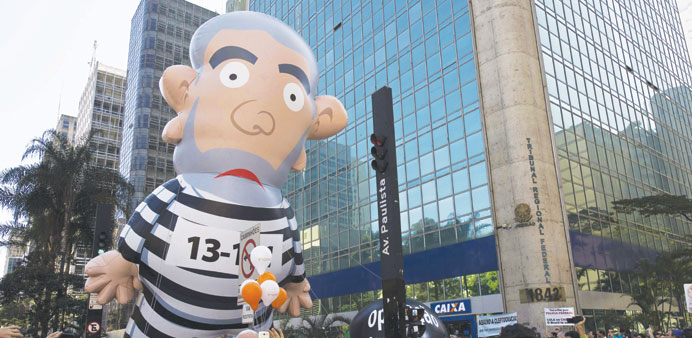Reuters/Brasilia
President Dilma Rousseff has dropped the idea of reinstating a tax on financial transactions to bridge a gaping fiscal deficit in Brazil after it ran into a barrage of criticism even from within her coalition, Brazilian media reported yesterday.
The Folha de S.Paulo and Estado de S.Paulo newspapers, citing presidential aides, said Rousseff abandoned the proposal because she realised there was no time to win its approval in Congress where the 2016 budget must be presented by today.
The president’s press office said it would not comment on the tax issue until today as Rousseff planned to continue discussing the budget with her ministers later yesterday.
The government was planning a bill reintroducing a 0.38% levy on financial transactions, known as CPMF, to raise an estimated 68bn reais ($19bn) a year in revenue.
Finance Minister Joaquim Levy said on Saturday the tax was needed to cope with Brazil’s fiscal crunch in a recession.
Levy said on Saturday he favoured reviving the tax to cope with Brazil’s fiscal crunch in a slumping economy, and warned that without new taxation the country could face a crisis like Greece’s.
“Nobody can agree that increased spending without increased taxation is viable,” Levy said at a financial markets conference organised by Sao Paulo bourse operator BM&FBovespa SA . “If you want to become Greece and say no to any kind of tax, that will have consequences.
Levy had said in June that the government was not planning to revive the CMPF.
To avoid becoming the next Greece, Brazil must face the reality of its deteriorated fiscal situation and then create the bases for a return to growth, Levy said.
He dismissed views that the austerity drive he is leading has pushed Brazil into recession, which he said is the result of the uncertainty prevailing among investors and businesses.
Levy told reporters he does not believe the recession will last two years, and some industries are showing signs of recovery and will see a turnaround by the end of the year. He cited the paper, glass and non-ferrous sectors.
He urged Brazilian entrepreneurs not to stand around idle waiting to see if Brazil loses its investment-grade credit rating.
A senior government official told Reuters on Friday that Brazil would not reach its 2016 fiscal savings target unless the CPMF, which was abolished by Congress in 2007, was reinstated.
But business leaders, opposition politicians and even her main coalition ally, the PMDB party led by Vice President Michel Temer, opposed the plan to revive the unpopular tax.
Both newspapers estimated that the shortfall in the 2016 budget at about 80bn reais and, if additional revenues are not found, the fiscal savings target for next year of 0.7% of gross domestic product might have to be reduced.
The fiscal crunch in the middle of a severe recession has undermined investor confidence and put Brazil at risk of losing its prized investment-grade credit rating next year.

People hold a huge inflatable depicting former Brazilian president Luiz Inacio Lula da Silva during a protest against President Dilma Rousseff and th
